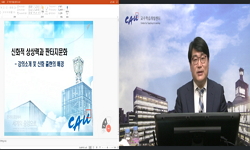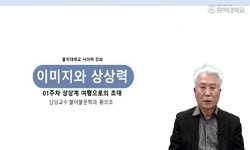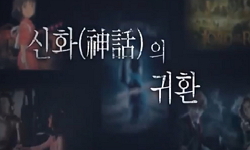이 글의 목적은 『상상된 주권들: 새로운 정치적 낭만주의를 향하여』에서 쿠이켄이 제공하는 상상력에 대한 논의를 토대로, 워즈워스의 『서곡』 속에 등장하는 세 장면을 다시 읽어보는 ...
http://chineseinput.net/에서 pinyin(병음)방식으로 중국어를 변환할 수 있습니다.
변환된 중국어를 복사하여 사용하시면 됩니다.
- 中文 을 입력하시려면 zhongwen을 입력하시고 space를누르시면됩니다.
- 北京 을 입력하시려면 beijing을 입력하시고 space를 누르시면 됩니다.
https://www.riss.kr/link?id=A109134862
- 저자
- 발행기관
- 학술지명
- 권호사항
-
발행연도
2024
-
작성언어
-
-
주제어
상상력 ; 무로부터의 창조 ; 윌리엄 워즈워스 ; 『서곡』 ; 시간적 공백 ; 자크 라캉 ; Imagination ; creation ex nihilo ; William Wordsworth ; The Prelude ; temporal gap ; Jacques Lacan
-
KDC
840
-
등재정보
KCI등재
-
자료형태
학술저널
- 발행기관 URL
-
수록면
5-30(26쪽)
- 제공처
-
0
상세조회 -
0
다운로드
부가정보
국문 초록 (Abstract)
이 글의 목적은 『상상된 주권들: 새로운 정치적 낭만주의를 향하여』에서 쿠이켄이 제공하는 상상력에 대한 논의를 토대로, 워즈워스의 『서곡』 속에 등장하는 세 장면을 다시 읽어보는 데 있다. 이러한 다시 읽기는 자크 라캉이 『정신분석의 윤리학』에서 소개한 ‘무로부터의 창조’란 개념에 대한 검토와 함께 진행된다. 라캉이 말하는 ‘무로부터의 창조’는 무로부터 유가 창조되는 상황을 지시하는 것이 아니다. 이 개념에서 강조되는 것은 오히려 상징적 의미의 구성과 함께, 이 상징적 의미로 환원될 수 없는 무 또는 공백의 창조가 ‘동시적으로’ 발생한다는 점이다. ‘무로부터의 창조’란 개념은, 무엇보다 워즈워스의 『서곡』 읽기와 관련해서 반복적으로 거론되는 주체/자연, 과거/현재, 전체/부분이라는 대립구조를 재고할 수 있도록 해준다는 점에서 중요하다. 『서곡』 6권을 다시 읽는 과정에서 논의의 초점은, 화자가 의식하지 못한 사이 지나가 버린 알프스 정상에의 도달 순간이 상상력의 영광을 노래하는 현재 속에서 재구성되는 과정에 맞춰질 예정이다. 이미 지나가 버린 과거의 순간은 현재 속에서 반복됨으로써 의미를 갖게 되지만, 동시에 이는 현재에 공백을 창조해 상상력의 영광에 대한 인식이 완결될 수 없도록 만든다. 7권 다시 읽기에서 분석 대상이 되는 부분은, 화자가 눈먼 거지와 만나는 장면으로, 여기서 문제가 되는 것은 전체/부분의 대립구조이다. 눈먼 거지가 주요한 검토 대상이 되는 이유는, 그가 런던이라는 전체 속에 ‘있는’ 부분이지만, 동시에 동질적인 전체 속 무한히 대체가능한 부분으로 더 이상 고려될 수 없는 ‘텅 빈’ 존재라는데 있다. 8권 다시 읽기는 런던 진입 장면에 등장하는 ‘지금’이라는 단어에 주목함으로써 시작된다. 첫 번째 ‘지금’이 두 번째 ‘지금’의 반복을 통하지 않고는 적절하게 의미화될 수 없지만, 두 번째 ‘지금’의 반복 속에서 첫 번째 ‘지금’의 흔적이 여전히 살아남아 있을 가능성이, 다시 말해 두 ‘지금’의 겹침이 공백의 창조로 이어지는 과정이 주요 논의 대상이 된다.
다국어 초록 (Multilingual Abstract)
This essay attempts to read three scenes of The Prelude by William Wordsworth, using as guiding thread what Kir Kuiken articulates with regard to the concept of imagination in his book, Imagined Sovereignties: Toward a New Political Romanticism. In or...
This essay attempts to read three scenes of The Prelude by William Wordsworth, using as guiding thread what Kir Kuiken articulates with regard to the concept of imagination in his book, Imagined Sovereignties: Toward a New Political Romanticism. In order to bring Kuiken’s articulation of imagination to bear on the psychoanalytic concept of the void of the Thing, the essay will make a detour through the notion of creation ex nihilo that Jacques Lacan introduces in his book, The Ethics of Psychoanalysis. The notion of creation ex nihilo should not be taken to imply the process in which something is created from nothing. At stake here is nothing less than the simultaneity between the construction of the symbolic meaning and the introduction of a void. What Lacan elaborates regarding the creation ex nihilo is worth dwelling upon in that it allows us to problematize the opposition of subject and nature, past and present, whole and part which has functioned as the basic theme in the previous readings of The Prelude. The analysis of Wordsworth’s recounting of his passage across the Alps in book six of the Prelude is centered primarily on the way in which the missed crossing of the Alps is (re-)constructed in the ode to the imagination that follows. The episode of the blind beggar in book seven is especially important for grasping the logic that makes the ‘whole’ and the ‘part’ inextricable from but at the same time irreducible to each other. The reading of book eight begins with a consideration of the two “nows” in the passage of Wordsworth’s entrance into London. This leads us to formulate the singular way in which the first “now” is intermingled with the second “now,” instead of trying to figure out the extent to which the significance of the first “now” can be restored through the second “now.”
목차 (Table of Contents)
- Ⅰ. 들어가며
- Ⅱ. 『서곡』 6권 다시 읽기: 이미 지나갔지만, 아직 오지 않은 순간으로서의 상상력
- Ⅲ. 『서곡』 7권 다시 읽기: 텅빔의 상상력
- Ⅳ. 『서곡』 8권 다시 읽기: 반복으로서의 ‘지금’
- Ⅴ. 나가며
- Ⅰ. 들어가며
- Ⅱ. 『서곡』 6권 다시 읽기: 이미 지나갔지만, 아직 오지 않은 순간으로서의 상상력
- Ⅲ. 『서곡』 7권 다시 읽기: 텅빔의 상상력
- Ⅳ. 『서곡』 8권 다시 읽기: 반복으로서의 ‘지금’
- Ⅴ. 나가며
- 인용문헌
동일학술지(권/호) 다른 논문
-
Character as a Web of Words: Towards a Network Theory of Narrative
- 한국비평이론학회
- 김용수(Yongsoo Kim)
- 2024
- KCI등재
-
경계 밖(Extra moenia)에서: 내적불안(Inquietudine)은 연대의 가능성일까, 파편화(frantumaglia)일까
- 한국비평이론학회
- 박문정(Moonjung Park)
- 2024
- KCI등재
-
데이터 자본주의의 알고리듬 통치성과 디스토피아 빌둥스로만(Dystopian Bildungsroman)
- 한국비평이론학회
- 윤재원(Jaewon Yoon)
- 2024
- KCI등재
-
데리다의 채식주의 비판과 에코페미니즘의 맥락적 채식주의 윤리
- 한국비평이론학회
- 백종륜(Jong-Ryun Baek)
- 2024
- KCI등재





 스콜라
스콜라






